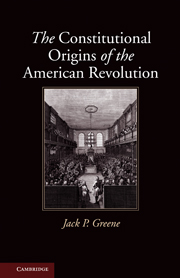4 - Empire shattered, 1774–1776
Published online by Cambridge University Press: 05 June 2012
Summary
When Parliament’s passage of the Tea Act in May 1773 revived the dispute over its colonial authority, colonial resistance to that measure provoked the crisis that would, in a mere two and a half years, lead to the secession of a significant part of the early modern British Empire. At no time during this crisis did either side show much disposition to compromise. As each quickly took a determined stand on the position marked out by its most extreme proponents during the previous crises, the spirit of conciliation that had marked the crisis over the Townshend Acts rapidly gave way to complete intransigence. While the metropolitan political nation refused to back down from its insistence that the king-in- Parliament was the supreme sovereign of the empire, the colonial assemblies and the First and Second Continental Congresses, composed of delegates from the thirteen colonies from New Hampshire south to Georgia, gave official sanction to views that had previously been held only by private individuals, views developed by Franklin and others during the late 1760s and early 1770s that called for complete colonial autonomy over internal affairs. By 1776, what had begun as yet another crisis over Parliament’s right to tax the colonies had become a crisis over whether the colonies would become independent, and the empire foundered over the inability of Britain and the colonies to agree on a formula for governance that would give Britons overseas the same legal and constitutional rights and the same control over their domestic affairs as Britons at home.
In both Britain and the colonies, supporters of Parliament’s right to legislate for the colonies insisted, as they had ever since the beginning of the controversy during the Stamp Act crisis, that the British Empire, consisting of Great Britain and all its territories, was a single state composed of “ONE people, ruled by ONE constitution, and governed by ONE King.” Arguing that the early Stuarts, no less than the postrevolutionary Hanoverians, had always been “under the control of the other parts of the legislative power” and therefore had no authority to exempt the colonists from Parliament’s jurisdiction, they held that the colonists were “subjects of the Kings of England, not as the inhabitants of Guyenne formerly were, or as those of Hanover now are, but subjects of an English parliamentary King.” As such, like all other Englishmen, they necessarily owed obedience to parliamentary statutes.
- Type
- Chapter
- Information
- The Constitutional Origins of the American Revolution , pp. 149 - 186Publisher: Cambridge University PressPrint publication year: 2010



